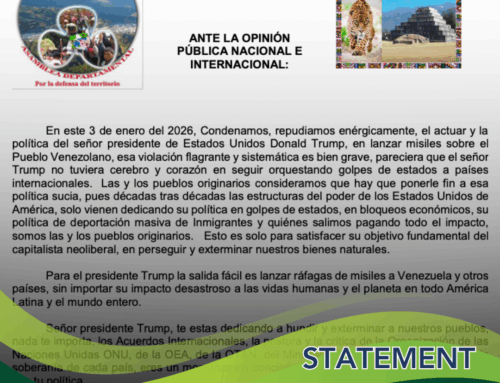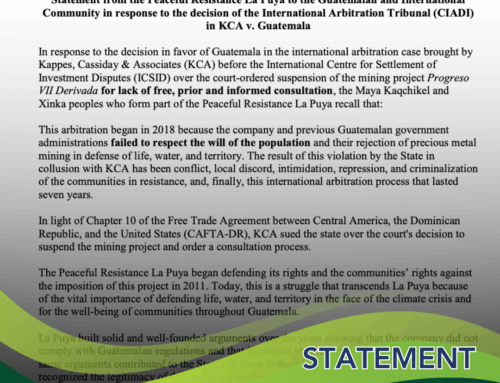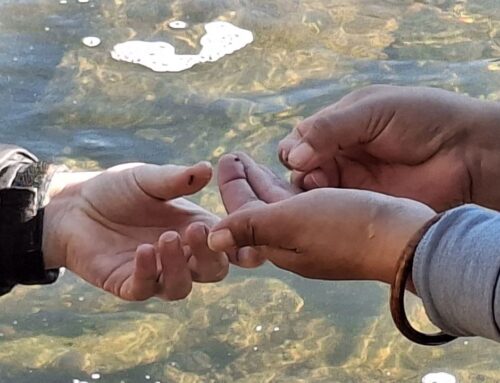July 23, 2019
Escalation of tension, threats and defamation against the peaceful resistance to mining in Mataquescuintla, Guatemala
On July 5th, in the evening, members of the Peaceful Resistance of Mataquescuintla were at one of the two encampments set up on either side of the Escobal mine, owned by Canadian mining company, Pan American Silver. At 9:50pm, a man known to those present at Mr. Henry Manrique Reyes arrived at the encampment. He was armed and began threatening to kill members of the resistance, specifically asking for community leader, Julio David González Arango. Fearing violence, the community members called the National Civil Police (PNC) station in Mataquescuintla. When the police arrived, agents ignored information provided by members of the resistance that Mr. Reyes was carrying a shotgun. When the police agents finally found the gun in Reyes truck they confiscated it, but allowed Reyes to go free. Reyes spent the rest of the night threatening González Arango outside of his mother-in-law’s house.
The following Sunday, July 14th, Mr. Henry Reyes showed up again at the home of family members of Julio David González Arango while Mr. González was visiting. Reyes threatened González Arango with a hatchet, frightening him and his family, including his children. When family members called the police regional headquarters in Jalapa, agents stated that they could not respond to the call because they didn’t have enough gasoline to travel to the community. The PNC finally responded several hours later and only after being contacted by various national and international civil society organizations. Even after the incidents on the 5th and the 14th of July, Reyes continues to defame members of the resistance using his radio station, Stereo Colís, and his social media accounts, stating that he has been the victim of attacks by members of the resistance.
The following Sunday, July 20th, Mr. Henry Reyes went to the business of another community leader, Adolfo Valenzuela, armed with a baseball bat. At the time, Valenzuela’s son was minding the business. Reyes demanded that Valenzuela and his brother come out to the street, saying he wanted to kill them. Reyes then proceeded to damage Valenzuela’s vehicle with the bat.
These incidents are occurring within the context of the more than two-year long suspension of the Escobal mine and the consultation process ordered by the Guatemalan Constitutional Court with the Xinka communities affected by the mine in southeastern Guatemala. They are part of a growing state of tension, threats and defamation against members of the Peaceful Resistance of Santa Rosa, Jalapa and Jutiapa during this same period.
A pattern of defamation and insecurity for defenders
Mr. Reyes, high school director and owner of the local radio station Stereo Colís, has been defaming members of the Peaceful Resistance of Mataquescuintla for more than five years, using his position as a radio host to accuse them of being terrorists and criminals. On numerous occasions, he has made explicit accusations, without proof, against specific members of the Resistance of being responsible for violence.
Since 2010 members of the peaceful resistance against mining in the region have suffered death threats and defamation by state actors and individuals aligned with the mining company and its interests. The defamation by Reyes against members of the resistance in Mataquescuintla is part of this pattern of defamation, intimidation, criminalization and violence against people who are organized in defense of the territory and against mining and the Escobal mine. In September 2018, Protection International published a report analyzing attacks against defenders of the Peaceful Resistance in Santa Rosa, Jalapa and Jutiapa between 2017 and 2018. Its investigation documented a series of attacks as well as acts of provocation, intimidation and criminalization, as well as defamation campaigns and pressure by armed groups, and groups of people aligned with the mining project.
The report states, “Through the media and social networks the aggressor in this scenario publishes racist messages to stigmatize human rights defenders with the objective of defending the economic insteres of the mining companies and defaming the work of human rights defenders. The company and its allies use large, corporate media outlets to carry out defamation and disinformation campaigns. Various incidents identified as likely provocations intended to defame or criminalize, triggered widespread media attention. HRDs were accused of committing crimes like “terrorism or kidnapping.’”
Similarly concerning is the National Police’s failure to adequately respond or to respond impartially to complaints and requests from resistance leaders. This was the case on June 23rd when Quelvin Jiménez, attorney for the Xinka Parliament, was detained for more than five hours by the PNC after an outbreak of violence during a community assembly in Jumaytepeque. The Xinka Parliament and Jiménez had on multiple occasions requested the presence of the PNC at the assembly, however, the agents did not arrive until the violence, led by Cristina Ana Line Villalta García, an ally of the mining company, and a group self-identified as the Agricultural Community, had already begun.
The Peaceful Resistance in Mataquescuintla: Strong and Permanent
The municipality of Mataquescuintla was one of the first to hold a municipal consultation in November 2012, wherein 98% of the population voted against mining in their territory. As a way of complying with the results of the consultation vote, the mayor refused to accept royalty payments from the mine and ensured that, to this very day, that the mining company could not connect to the national electric system via the electrical substation located within the municipal limits of Mataquescuintla.
In May 2013, shortly after the mine’s operating license was approved without adequately processing the more than 200 complaints that were submitted as allowed under the mining law, the Guatemalan State declared a State of Siege and collaborated with the company to put the mine into operation through the militarization of the region. During this time period, the State installed three military bases in the region, one of which was located in Mataquescuintla and operated for over two years. In addition to the militarization of the area, local leaders from Mataquescuintla, and other areas, were criminalized, threatened, and assassinated. In April, 2014, youth leader, Topacio Reynoso was assassinated for her role in the Resistance. She was 16 years old. Her father, Alex Reynoso, was shot and injured in the same attack as his daughter, and was later targeted and attacked again, in October 2015.
In early 2019, Canadian mining company, Pan American Silver bought Tahoe Resources and the Escobal mine despite the clear lack of social license to operate and the historical and current context of violence and human rights violations.
This article was written through a collaboration between Earthworks, Institute for Policy Studies – Global Economy Project, Maritimes-Guatemala Breaking the Silence Network, MiningWatch Canada, and NISGUA.






Leave A Comment